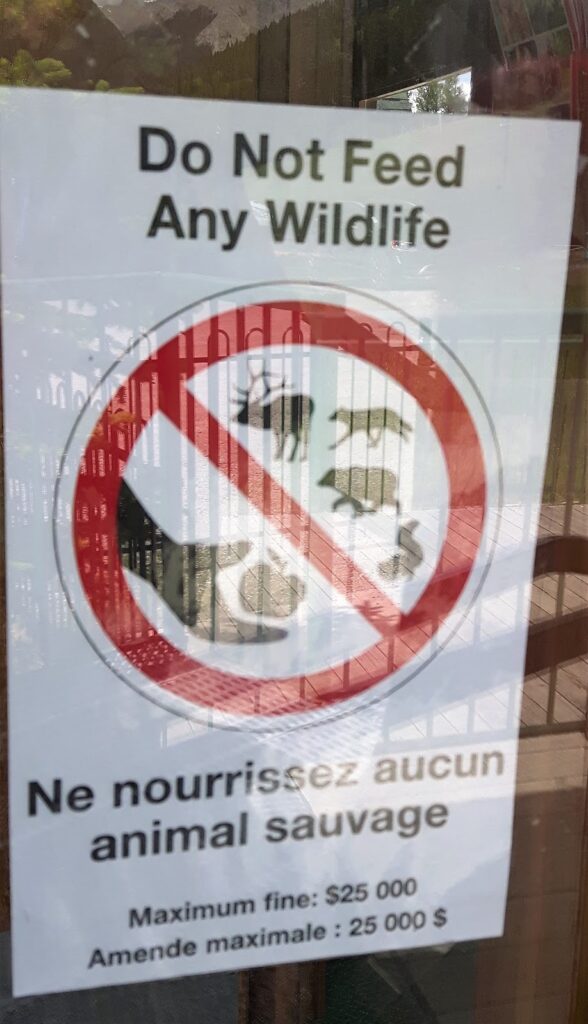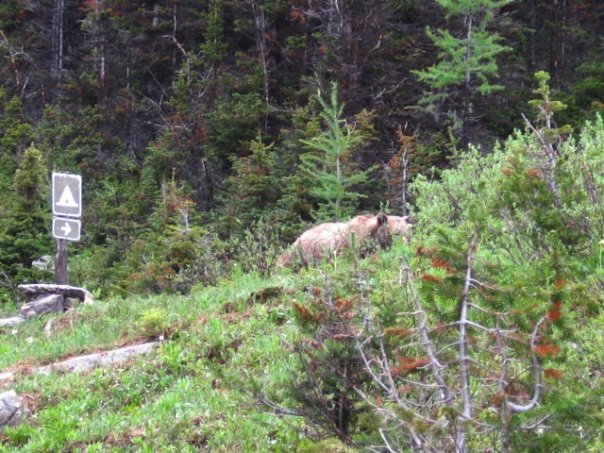- 1 bear attack in Canmore
- 1 bear attack in Waiparous (north of Cochrane)
- Bold wolves in Banff Campgrounds
 |
| Don’t feed wildlife! |
2. Educate Others: Some people have never seen a bear and don’t believe that one would come into a crowded campground. Of course, that is not the case. Do what you must – if you have to scare the bejeesus outta them to make them put their shit away, so be it. I like telling people that bears come around the campground every night after you go to sleep. Works like a charm! Likewise, many people don’t seem to understand that very placid looking moose, elk, or bison can hurt you if you get too close, approach their babies, or are within 100 metres of them during rutting season (when males are extremely territorial). Keep your distance, please!
 |
| Bison near our site in Yellowstone National Park |
3. Say No To Bear Jams: Stopping on the side of a twisty mountain road is not only dangerous from a traffic perspective, it accustoms bears to human company. As civilized as that sounds, you do not want to have tea with a bear (guess who will be doing all the eating?). Slow down and snap a photo from the car if you must, but please don’t stop. If you’re brave enough, you can lay on the horn as you drive by to break the bear jam up. When I spoke with WildSmart educators last month, they advised me this was a helpful thing to do (but to expect some ticked off people – one of their employees was tailed and harassed for doing so).
 |
| See! Bears DO hang out near campgrounds! |
5. Respect Trail Closures: Trails are closed on a temporary or seasonal basis for a variety of reasons: prime wildlife habitat, environmentally sensitive area, caribou winter grounds, mountain sheep calving area, carnivores feeding on a carcass, mother bears with cubs. You may put yourself at risk entering these areas, or you may endanger wildlife. I heard a sad story this summer of how the caribou population near Maligne Lake was decimated. The Maligne Lake Road and winter backcountry users allowed wolves to get in to an area historically safe for the caribou in winter (caribou have big hooves to travel on snow, wolves cannot move through deep snow). It is unlikely that Maligne Lake herd will last long with only 3 individuals left. We need to think of the long term effects of our actions and choose another path.
 |
6. Keep a Bare Site: All food and attractants must be put away when you are not at your campsite or when you go to sleep at night. This includes coolers (bears can smell 100 times better than us and can smell food inside them!), garbage, empty bottles, toothpaste, bug spray, pet food, barbecues, and dishes. If you are backcountry camping, hang your food high in a tree at least 100 metres from your tent or utilize the campground’s bearproof food lockers or bear wires for all food and attractants. It’s safer for you and your campmates and ensures animals don’t get rewarded for sniffing around camp.



